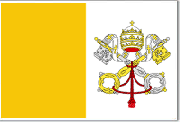Vatican Bank president removed by unanimous vote

The president of the Institute for Works of Religion, (IOR) or Vatican Bank, has been removed, after a unanimous vote of no confidence by the board of directors, the Vatican announced yesterday.
In a statement, they said Ettore Gotti Tedeschi had been ousted for failing to carry out "various fundamentally important functions of his office".
They added: "The board members are saddened by the events which led to this vote of no confidence, but believe that this action is important in order to maintain the vitality of the institute."
The bank is now seeking a new president who can "re-establish full and effective relations between the Institute and the financial community, based on mutual respect of internationally accepted banking standards".
Tedeschi told reporters he had lost his job because the bank did not like his honest way of doing things. "I don't want to speak or give interviews," he said. "I have paid for my transparency."
The Vatican Bank was founded in 1942 by Pope Pius XII, to provide funds for charitable works and overseas missions. In September 2010 an Italian investigation into the bank began, looking at possible money-laundering. 23 million Euros was frozen. The money was released in June 2011, but the investigation is ongoing.
The Vatican recently adopted new financial transparency laws and set up internal regulations to ensure that all financial transactions adhere to international regulations and standards.
But in January internal letters leaked to the press appeared to record some disagreements between top Vatican officials about how much information to reveal about transactions that took place before the new laws were enacted.
Last month the State Department put the Vatican Bank on its list of institutions at risk of being used by money launderers.
In June the EU will be considering a bid by the Vatican to be included on its 'white list' of states which comply with international standards against tax fraud and money-laundering.
On Tuesday the Vatican Bank invited a group of around 35 ambassadors to make a fact-finding visit. The diplomats were encouraged to ask questions about the Institute and the services it provides, as well as about its response to money laundering investigations and compliance with international standards.
Among those who visited the Institute on Tuesday was Britain's ambassador to the Holy See, Nigel Baker.
Mr Baker told Vatican Radio the visit would not immediately allay all concerns, but was part of a "process" He said: "It's only really been a year or so since new regulations have come into place improving the governance of IOR, improving its compliance with a range of recommendations of the international financial action task force. It is only since last year that the Council of Europe's expert committee - called Moneyval for short - on money laundering and financing of terrorism has had the chance to come to the Vatican to look at the IOR and other Vatican institutions that manage finances to see how they're doing, to provide recommendations and advice and to rate them, later on this year, against a range of international norms.
He continued: "I think that process will be bumpy because there will be some things where the IOR can't yet say we've reached full international compliance and indeed other Vatican institutions. But there are other areas where they can say we are absolutely compliant and get that validation for international standards. I think it's bold, it's brave to enter into this, because inevitably the criticism comes up, inevitably as you become more transparent, people will remind you of your past and - as with any good bank - there will be moments when a story comes up about transactions or about clients that don't fit in with the process of trying to improve transparency. I think that's something that everybody has to live with, but it doesn't invalidate the process, quite the opposite - with transparency comes showing off a little bit of the dirty washing as well and that's quite a normal part of the process."
With regard to the US State Department listing the Vatican as being vulnerable to money laundering, Mr Baker said: "These are very real concerns and one of the reasons why my government really encourages this process is that even the most respectable, well run bank or financial institution in the world will have some vulnerabilities, there's no such thing as an invulnerable bank or financial institution, as we've had to see recently on Wall Street and elsewhere. So those who wish to abuse the system for money laundering or for financing terrorism, will always be looking for loopholes, so in a sense this isn't a process that has an obvious end though there are staging posts along the way. Its also fair to say that when these concerns are expressed, the same concerns are expressed about British banks, American banks and financial institutions, but this is where the boldness comes in - of course by going down this process you open yourself up to questions.
"I think one of the objectives of the board, of IOR, is to show that they have modern procedures in place and they are as resistant as any other well run financial institution to being misused. It's for others to judge whether they have reached that goal or not, but I think it's very important that they are trying to go down that route."
Source: VIS/Vatican Radio/APA


















